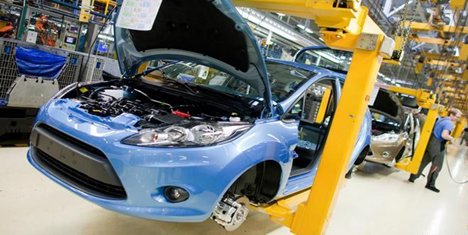
Sixteen EU car manufacturers have sent a complaint to Egyptian government about the poor quality of petrol in filling stations, which causes motor damages
The European Automobile Manufacturers’ Association (ACEA) on 8 February sent an email to Minister of Petroleum and Mineral Wealth Tareq El-Molla, Minister of Investment and International Cooperation Rania Al-Mashat, and Head of the Consumer Protection Agency Ayman Hossam El Dien, complaining of the “poor quality unleaded petrol marketed in Egypt leading to vehicle technical problems – major concerns by the European Motor Vehicle Manufacturers Industry”.
ACEA represents the 16 European based manufacturers of passenger cars, light commercial vehicles, heavy-duty commercial vehicles, buses and coaches.
“We respectfully address this letter for your consideration since several vehicle manufacturers producing vehicles circulating in Egypt are faced with an increasing number of claims from owners and operators which appear related to the poor quality of petrol being marketed in Egypt,” the letter, signed by Eric Mark Huitema Director General ACEA read, stating that:
“For turbo-charged vehicles, we have seen many instances of engines frequently and suddenly entering anti-rumble engine protection mode (low speed pre-ignition, LSPI) by a sudden and very sharp cut of the engine fuel injection,” stressing that this is due to the very poor quality of the fuel.
The letter said that customers have been experiencing very unpleasant engine and vehicle behavior, with serious engine jerking leading to engine failure.
“Several hundred vehicles have broken down during 2021. Some vehicles have broken- down after only 10,000 km of use due to the use of poor quality. After analysis, the presence of manganese in regular unleaded 92 (RON) petrol and premium unleaded 95 (RON) petrol has been detected.
The letter stated that the areas of concern were mainly Cairo and Suez, while not detecting the presence of manganese in petrol in the areas of Alexandria and Mersa Matruh.
According to ACEA letter, other car manufacturers have reported technical problems in Egypt since February 2021 with the number of reported cases continuing since then. In autumn 2021, the problem was quite common with customers contacting dealerships to report problems and have them fixed.
Customers noticed reduced engine power and engine pre-ignition detection warning messages on the dashboard. Fuel recovered from several affected vehicles were sent to laboratories and fuel analysis demonstrated the presence of manganese at a level of between 26 and 46 mg/kg.
Fuel samples were collected from both the Cairo and Suez governates. The presence of manganese in petrol could be linked to the use of the metallic additive having the trade name “MMT”, which is used as a petrol octane booster.
Tamer Hegazy, a Facebook user made a post, saying that: “Finally, the manufacturer cannot remain silent any longer, for patience has limits. An official letter from the European Automobile Manufacturers Association (ACEA) to the Egyptian Ministry of Petroleum. ACEA confirms the poor state of Egyptian fuels 92 and 95 with high levels of manganese and nitrogen oxides, which destroy modern car engines.”

It has been widely demonstrated that the presence of manganese in petrol would lead to the following problems in vehicles:
– Irreversible catalytic converter clogging: While reducing the effectiveness of the catalyst in reducing pollutant emissions, this could also lead to accelerated catalyst failure & abnormal levels of noise in affected vehicles.
– Irreversible spark plug damage: This would lead to engine misfire and significant damage/failure to the catalytic converter.
– Low-speed engine pre-ignition: This would lead to engine damage and abnormal noise (e.g. engine knocking).
– Increased tailpipe pollutant emissions: Increased emissions of carbon monoxide (CO), hydrocarbons (HC) and oxides of nitrogen (NOx) due to the reduced effectiveness of the catalytic converter and increased particle emissions (particle number, PN and particle mass, PM) via increased emissions of manganese-based metallic material.
“We respectfully ask the Egyptian authorities to take swift action to ensure the quality of petrol sold in the Egyptian market is fit for purpose, to ensure satisfactory engine and exhaust aftertreatment performance and customer experience,” the ACEA letter read, concluding:
“In particular, we respectfully request that the use of metallic additives (manganese based and also iron (ferrocene) based), be prohibited or at least Egypt’s petrol quality specifications follow the approach of European standard EN228 for unleaded petrol or the European Union Fuel Quality Directive which both limit manganese content to a maximum of 2 mg/l in motor fuels and require fuel pumps containing metallic additives to be labelled to identify the sale of metal-containing fuels so customers can choose the right fuel for their vehicle according to vehicle manufacturer recommendations.”
Egyptian Petroleum Ministry denies
In response, Spokesman for the Egyptian Ministry of Petroleum Hamdy Abdel Aziz has denied the presence of manganese in Egyptian fuel and any other metals that might harm the car’s engine, pointing out that Egyptian fuel conforms to standard specifications.
“Egyptian fuel is a local product, and it is produced from Egyptian refineries, and manganese, if it is placed, will harm the refining equipment and speak malfunctions,” Abdelaziz added, in a TV interview, Saturday (5 March), stressing that the warehouses in which the gasoline is stored, samples are analyzed, as well as in the underground tanks of petrol stations.
“We pump 30 million liters per day into all gas stations, noting that this problem is said to have appeared in Cairo and Suez,” he noted, wondering: “Why weren’t the rest of the stations affected in the rest of the cities and governorates, especially since the product is the same in all stations?”



